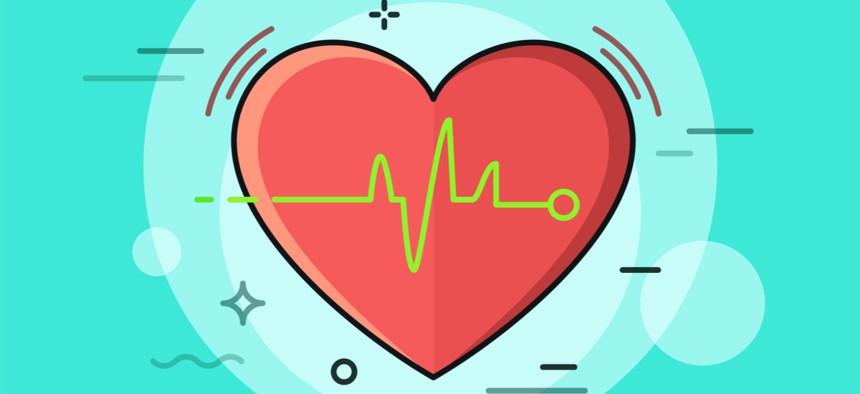The First Smartphone App to Detect Actual Heart Attacks Probably Won’t Be Apple’s

Andrew Krasovitckii/Shutterstock.com
This app could detect a type of heart attack caused by complete blockage of an artery.
One of the biggest challenges in treating heart attacks is they can sometimes go undiagnosed in the immediate aftermath. Any delay in receiving treatment increases the chance that an attack could be fatal.
One company is trying to find a way to diagnose severe heart attacks before patients even arrive at the hospital. Preliminary results presented at the 2018 American Heart Association’s Scientific Sessions in Chicago this weekend show that a smartphone app developed by the Silicon Valley-based startup AliveCor may be able to identify heart attacks at home. Specifically, it could detect a type of heart attack caused by complete blockage of an artery—referred to medically as an ST segment elevation myocardial infarction—almost as effectively as an in-hospital electrocardiogram.
The app (which AliveCor has not yet named) requires the use of some hardware: users need to purchase a device with two electrical leads that connect wirelessly to their smartphones, in addition to a free app. Normally, STEMI is diagnosed in a hospital setting with an ECG monitor that consists of 12 leads.
According to the study abstract, a team of scientists tested AliveCor’s app on 204 patients who were admitted to hospitals for chest pain. All of the patients were tested using the app as well as traditional ECGs. Doctors read both sets of results, without knowing which came from the app and which came from the ECGs.
In total, AliveCor’s app identified 71 STEMI patients, compared to 57 identified by ECGs. The study authors say that the false positives could be attributed to small mistakes caused by differences in the way the the apps’ two leads made their measurements.
Although the study was small, and notably not yet published in a peer-reviewed journal, scientists are hopeful that the app’s technology could make it easier to identify when patients need to seek medical attention for serious heart attacks. “This is a trial that showed it was possible,” Vic Gundotra, the CEO of AliveCor, told Quartz. He estimates another six months or so before the app receives approval from the Food and Drug Administration.
AliveCor has a track record of leading the market in wearable heat-condition detection. It was the first tech company to create an at-home ECG to diagnose atrial fibrillation, a potentially serious condition that causes an irregular heart beat. The FDA granted AliveCor approval to distribute the app and lead device, called KardiaMobile, to Android and Apple smartphone users in November 2015. It currently sells for $99.
After the FDA approval, AliveCor partnered with Apple to create a watch band that would utilize its AFib-detection technology. But then Apple went on to develop its similar capabilities for the Series 4 version of the Apple Watch on its own. The FDA granted Apple clearance to market the new Apple watch capabilities earlier this year.
It’s likely that AliveCor could bring the first at-home device capable of detecting one type of heart attack before Apple. STEMIs are typically considered the most severe types of heart attacks, and in the U.S. occur in about 77 out of every 100,000 people. Other types of heart attacks, like those caused by partial blockage of the arteries, are more common and occur in about 136 out of 100,000 people. Heart attacks, overall, are fatal about 16 percent of the time.
Ideally, AliveCor’s app would be an affordable way to bring ECG-equivalent technology to rural or underserved areas that lack sufficient ECG machinery. Or perhaps, Gundotra told Quartz that, it could be prescribed to patients most at risk of developing a blocked artery.
NEXT STORY: The Pentagon is Spending Big on RFID Tech





